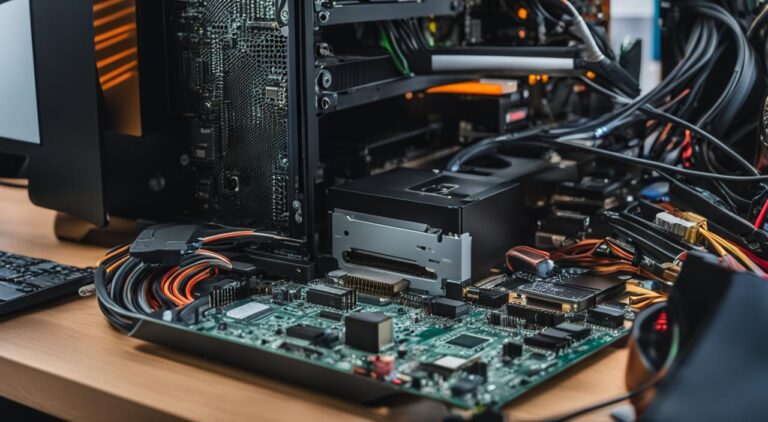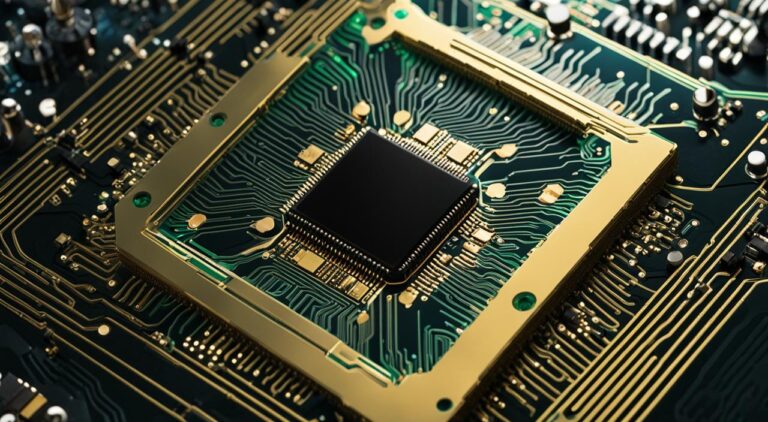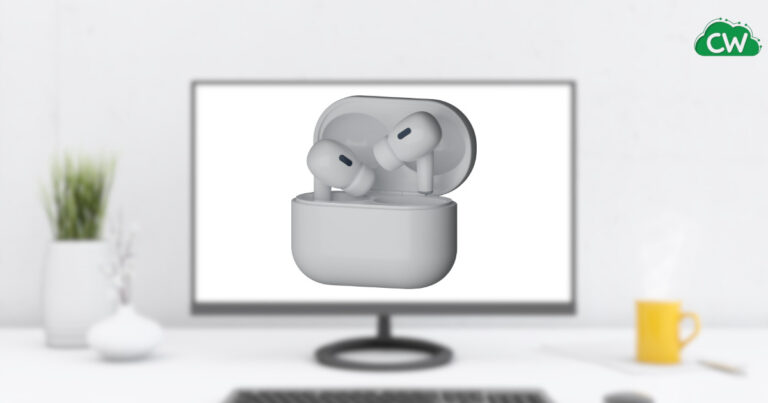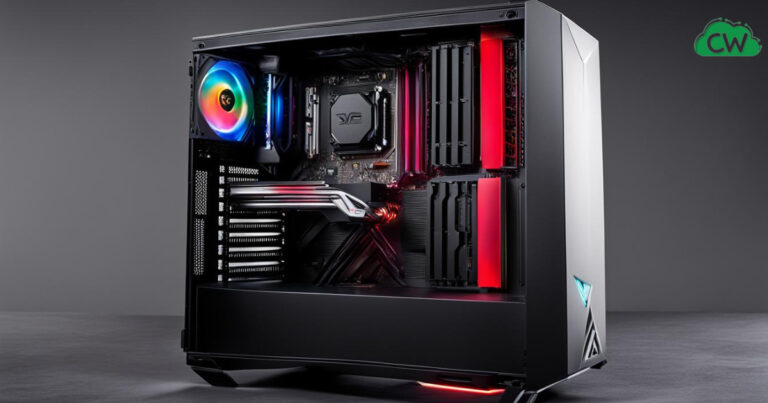How Much Does a Computer Weigh? (Explained)

Gone are the days of bulky desktop computers that were a hassle to move around. With advancements in technology, computers have become more portable and lighter.
However, the weight of a computer can still vary depending on its components and build. In this article, I will delve into the factors that contribute to the weight of a computer and provide insights on the average weights of different components.
When it comes to gaming PCs, they are typically heavier compared to regular desktop computers. On average, gaming PCs weigh between 20-40 pounds (9-18 kilograms).
It’s important to note that the weight can be influenced by various factors, such as the presence or absence of a dedicated graphics processing unit (GPU). A gaming PC without a GPU may weigh around 10-30 pounds (4.5-13.6 kilograms).
Each component of a computer also adds to its overall weight. For instance, a processor weighs approximately 2.1 ounces (59.5 grams), while a graphics card can range from 7 ounces to 3.2 pounds (200 grams to 1.5 kilograms).
The weight of the motherboard ranges from 1-3 pounds (450 grams to 1.3 kilograms), with RAM weighing between 1-4.5 ounces (28.3 grams to 127.5 grams).
Other components like the power supply, hard drive, SSD, and PC case also contribute to the overall weight, with individual weights ranging from a few ounces to several pounds.
It is worth mentioning that gaming PCs tend to be heavier due to their high-performance components and added features.
The weight of a gaming PC can impact its portability and ease of transportation. Additionally, larger PC cases and higher-quality builds can contribute to a heavier overall weight.
Comparing desktop computers to workstations and laptops, workstations generally weigh between 18-26 pounds (8.16-11.79 kilograms) due to their higher-end components and larger case sizes required for professional use.
On the other hand, laptops are much lighter, with gaming laptops typically weighing around 4-10 pounds (1.81-4.54 kilograms).
The weight of a computer plays a crucial role in determining its portability and suitability for different purposes.
Weight of Gaming PCs
Gaming PCs are known for their high-performance components and added features, but one notable characteristic is their weight. On average, gaming PCs weigh between 20-40 pounds (9-18 kilograms).
The weight of a gaming PC can vary depending on the specific components used and the size of the PC case.
When it comes to gaming PCs, the weight is primarily influenced by the powerful graphics processing unit (GPU) and the size of the PC case.
Gaming PCs with more powerful GPUs and larger cases tend to be heavier. These components contribute significantly to the overall weight of the system.
It’s important to consider the weight of a gaming PC when thinking about its portability. The heavier the PC, the less convenient it may be to transport.
This can be a crucial factor for gamers who frequently attend LAN parties or travel with their gaming setup.
Factors Affecting PC Weight
When it comes to the weight of a PC, several factors contribute to its overall heaviness. Let’s take a closer look at these factors and how they affect the weight of a computer.
Build Quality and Size of the PC Case
The build quality and size of the PC case play a significant role in determining the weight of a computer.
Higher-quality cases and larger sizes tend to weigh more due to the materials used and the additional space required to accommodate various components.
Components
The individual components of a PC also contribute to its weight. Graphics cards, motherboards, power supplies, and hard drives all have varying weights.
Graphics cards, in particular, can range from lightweight options to heavier models with advanced features.
The level of customization and the inclusion of additional features like RGB lighting and liquid cooling systems can add extra weight to the PC.
Average Weights of PC Components
| Component | Average Weight |
|---|---|
| Computer Case | 20 pounds (9 kilograms) |
| Motherboard | 1-3 pounds (450 grams to 1.3 kilograms) |
| Processor | 2.1 ounces (59.5 grams) |
| Graphics Card | 7 ounces to 3.2 pounds (200 grams to 1.5 kilograms) |
| RAM | 1-4.5 ounces (28.3 grams to 127.5 grams) |
| Power Supply | 2.5-5 pounds (1.13-2.27 kilograms) |
| Hard Drive | 1.6 pounds to 13.5 ounces (725 grams to 380 grams) |
| SSD | 2.5 ounces to 1 ounce (70 grams to 30 grams) |
Comparison to Workstations and Laptops
When it comes to computer weights, workstations and laptops offer some interesting comparisons to gaming PCs.
Workstations, designed for professional use, tend to be on the heavier side, weighing between 18-26 pounds (8.16-11.79 kilograms) on average. This is due to their high-end components, larger case sizes, and the additional features required to meet the demands of professional tasks.
On the other hand, laptops are known for their portability and lighter weight compared to desktop PCs. Gaming laptops specifically weigh around 4-10 pounds (1.81-4.54 kilograms), making them a more convenient option for on-the-go gaming or work needs.
The reduced weight of laptops is achieved by using more compact components and sacrificing some of the high-performance capabilities found in gaming PCs.
Considering the weight of a computer is crucial when deciding on a suitable option. Workstations, although heavier, offer powerful performance for professional tasks.
Gaming laptops, on the other hand, prioritize mobility while still providing a gaming experience. Ultimately, the choice between a gaming PC, workstation, or laptop depends on the user’s specific needs and priorities in terms of performance, portability, and ease of use.
FAQ
How much does a computer weigh?
The weight of a computer can vary depending on its components and build.
What is the weight of a gaming PC?
Gaming PCs are typically heavier, weighing between 20-40 pounds (9-18 kilograms) on average.
How much does a gaming PC weigh without a GPU?
The weight of a gaming PC without a GPU can be around 10-30 pounds (4.5-13.6 kilograms).
What factors affect the weight of a PC?
The weight of a PC is affected by factors such as the build quality and size of the PC case, the specific components used, and any additional features.
What are the average weights of PC components?
- Processor: 59.5 g
- Graphics Card: 7 oz – 3.2 lbs (200 g – 1.5 kg)
- Motherboard: 1 – 3 lbs (450 g – 1.3 kg)
- RAM: 1 – 4.5 oz (28.3 g – 127.5 g)
- Power Supply: 2.5 – 5 lbs (1.13 – 2.27 kg)
- Hard Drive: 13.5 oz – 1.6 lbs (380 g – 725 g)
- SSD: 1 – 2.5 oz (30 g – 70 g)
- PC Case: 10 – 30 lbs (4.5 – 13.6 kg)
How does the weight of gaming PCs compare to workstations and laptops?
Gaming PCs tend to be heavier than workstations and laptops. On average, a gaming PC weighs between 20-40 pounds (9-18 kilograms), while workstations weigh between 18-26 pounds (8.16-11.79 kilograms), and gaming laptops weigh around 4-10 pounds (1.81-4.54 kilograms).






